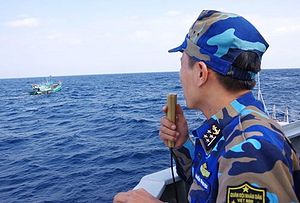This week, Vietnam’s deputy defense minister paid a visit to Thailand in yet another official exchange between the two Southeast Asian states. The interaction highlighted the ongoing activity on the defense side of the strategic partnership that both sides have forged over the years.
As I have noted before in these pages, the security realm has long factored into wider cooperation between Vietnam and Thailand. Though their relationship had been characterized by animosity for much of the Cold War, it has gradually warmed since, including in the defense domain.
While the security aspect of ties has covered various areas, be it opportunities for collaboration between the services or addressing challenges such as transnational crimes or the regulation of fishermen in maritime boundaries. Both sides have also been looking to further boost their defense collaboration, whether in terms of holding dialogues and setting up hotlines, stepping up visits and training between the various services, or increasing the sharing of experiences in areas like UN peacekeeping operations and humanitarian mine action.
That general trend has continued on into 2018 as well. This includes older and more established aspects of defense ties, such as personnel visits and exchanges, as well as the advancement of new mechanisms, such as the Defense Policy Dialogue which was inaugurated last year between the two countries, with the second iteration held this year as well.
Last week, Vietnam’s Deputy Defense Minister Phan Van Giang visited Thailand. Giang was on a trip that also consisted of several other officials in what was characterized by Vietnamese accounts as a high-ranking military mission.
Giang’s visit to Thailand saw him meet with a range of officials and have a series of interactions, including with Thailand’s Defense Minister and Deputy Prime Minister Prawit Wongsuwan and Commander in Chief of the Royal Thai Armed Forces (RTAF) Ponpipaat Benyasri.
During their talks, the delegations from Thailand and Vietnam touched on a range of issues within their bilateral relationship as well as on regional and international issues that both sides will be even more exposed to as they hold the ASEAN chair in 2019 and 2020 respectively.
Vietnam’s defense ministry said that the two sides agreed to expand their collaboration in the fields of delegation exchange, education and training, and cooperation in the navy and air force, while they also discussed collaboration in certain sectors where they would look for more specific initiatives as well.
Beyond the talks, Giang also had several other interactions during his trip to Thailand that spotlighted some of the areas that the two sides are looking at within the defense domain. For example, he visited the Counterterrorism Operations Center of the RTAF, which is one of Thailand’s facilities for addressing the challenge which has been on the top of the agenda among Southeast Asian states in recent years.
Unsurprisingly, beyond that, few additional specifics were provided. But as visits and exchanges such as these continue through the year and onto 2019 and 2020, as both countries take turns to chair ASEAN, the security component of the Thailand-Vietnam relationship will continue to be an interesting area to watch.






























